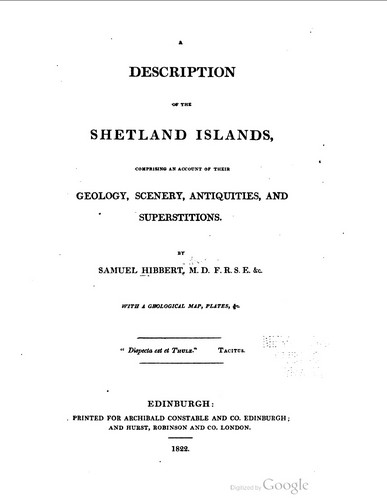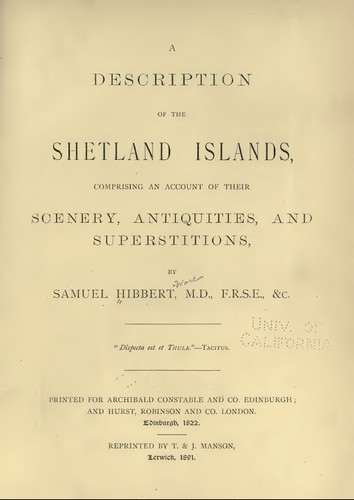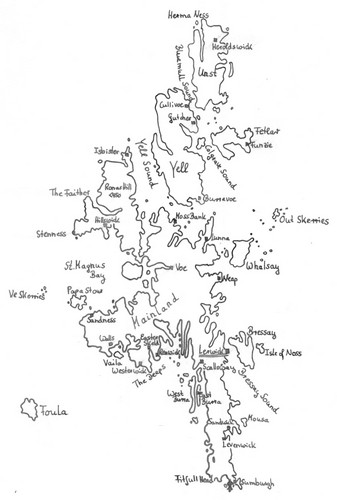 |
Description Of The Shetland Islands, Comprising An Account Of Their Geology, Scenery, Antiquities, And Superstitions. With A Geological Map, Plates, &c. Samuel Hibbert, M. D.F.R.S.E. &c., Archibald Constable And Co., Edinburgh, 1822 (Digitized by Google) |
 |
A Description Of The Shetland Islands, Comprising An Account Of Their Scenery, Antiquities, And Superstitions Samuel Hibbert, M.D., F.R.S.E., &c., Archibald Constable And Co. Edinburgh And Hurst, Robinson And Co., London, 1822 Reprinted by T. & J. Manson, Lerwick, 1891 (Digitized by Internet Archive with funding from Microsoft Corporation) |
Page 270-272: "ANCIENT STATE OF THE JURISDICTION OF SHETLAND, DURING THE SUBSITENCE OF THE LAW-COURT OF THINGVALL OT TINGWALL.
When, in the 9th century, colonists from Norway peopled Iceland, their first object was to erect at the place where they landed a temple to the God Thor, which served alike for religious and juridical purpose; but at a later period, when Christianity had forbiddem the reverence that had been paid to the deified heroes of the Edda, legislative convocations were held at a place called Thingvalla, on the shores of a salt-water lake. It is not a little remarkable, that the same sequence of events took place at Shetland. HAROLD landed at a bay now named Haroldswick, situated at the Island of Unst; and on the adjoining promontory appears a Scandinavian temple which the early colonists erected, that has from time immemorial been named the House or Seat of Justice; but at a later period, the Provincial Assembly of Shetland held their meeting in a valley on the small holm adjoining the shore of a fresh water lake, ... In the commencement of the 17th century, all the ancient law-books of Shetland were destroyed, and a newer municipal code, under the name of the Country Acts of Shetland, was passed at the general Legislative Meetings of the Law-ting, which was intended for the district; ...
When the householders of a district were assembled, they were empowered to select ten or twelve respectable individuals out of their number, to serve the offices of Rancelmen. ... The clerk of the court read a list of such honest men in the parish as were proper for the office, and these individuals were severally asked if they were willing to serve in it. If any of them, without assigning a sufficient reason, refused the appointment, he was liable to the penalty of L. 10 Scots. ... In the first place, he was intended to be the guardian of the domestic morals of the district ... Secondly, The Rancelman was to be the guardian of the religion of the district; ... Thirdly, He was to be the guardian of the commercial dealing of the parish; ... Fourthly, He was made inspector of the agriculture of the parish; he was to oversee the building of dikes, to punish for trepasses on land, to try the merits of sheep-dogs, &c. Fifthly, He was to be a steward for landlords; ... Sixthly, He was to punish idle vagabond persons, and to take charge of the poor. Seventhly, He was to inform against all persons using any manner of witchcraft, charms, or any abominable or devilish superstitions, ... and, lastly, He was to be the general thieftaker; ...
Along with the appointment of rancelmen, a Lawrightman was selected in each district for the regulation of weights and measures. ...
In ancient Scandinavia, ... it was customary at popular assemblies to appoint a bailiff for each district, who was to be a person distinguised for Prudence, and possessed of a certain income in land, for fear his poverty should expose him to contempt or corruption. Judicial officers of this kind were chosen in Shetland, but when the country was annexed to Scotland, the appointment of them was given to some superior of the lands, or farmer of the Crown revenues. In early times, each bailiff of Shetland was known by the name Foude; this appellation being given to any law officer who presided at a court. ...
Page 425-426: LUNNA TO AITHVOE.
... On approaching the dwellings of a humbler description, the traveller is often surprised with the great number of domestic fowls that are reared, the encouragement given to this race having probably originated in the ancient requisition of an annual number of fowls due to the falconer of the Royal household, for the alleged purpose of supporting the King's hawks that were collected in Shetland. ... During the Scottish government of Shetland, each parish afforded the falconer who was sent over the means of feeding the King's hawks, by an obligation to furnish for this purpose a certain quantity of carrion, dogs, horses, or other garbage; ...
Page 434-441: ANCIENT AND PRESENT STATE OF THE SHEEP PASTURES OF SHETLAND.
The country of the south and south-west of Olnasfiord consists of bleak and uninhabited hills, which form part of the scatholds of the Mainland, where there are neither partridges, moorfowl, nor hares to afford amusement for the sportsman; but, in the place of them, he may hear the shrill and plaintive notes of the curlew and plover, or the whistling of the snipe.
The tenants of the scatholds were the wild sheep of the country, celebrated for their small size, and known by naturalists under the name of oves cauda brevi, ... in very few places are the Shetland sheep mixed with a Northumberland breed. Their colour is exceedingly various, being grey, black, dunnish brown, white, or they are streaked and speckled in the most curious manner with a combination of various tints and shades. Besides the distinctive character which they posses, from the shortness of their tails, their horns are also very small. In summer they collect from the pastures that kind of food which the natives still designate by the ancient Scandinavian term of Lubba, expressive, in the original sense, of coarseness or roughness. Lubba comprises those common productions of the hills which are found where heath is absent; ... Burra, which is the provincial name given to the Juncus sqarrosus, serves the animals during the winter. But besides these productions, the Erica vulgaris and tetralix are the last resources. The sea also affords provision for the wild inhabitants of the Shetland sctholds, and there almost appears to be a peculiar instinct, which, in the severer months of the year, prompts them, upon the ebbing of the water, to flee to the shore, where they remain feeding on marine plants until the flow of the tide; they then return to the hills. ...
The sheep are allowed to run wild among the hills, herding and housing being almost wholly unknown in Shetland. ..., the sheep are almost to be regarded as in a state of nature, since they range at large over the scatholds during the whole of the year. No food is provided for the poor animals during deep falls of snow, nor is there any friendly shepherd to drive them to some buill, or dry place of shelter, where the lives of numbers of them might be preserved. Upon the approach of a storm, a sense of common danger causes them to congregate for self-defence beneath the shelter of some rock on the sea-shore, where they protect themselves from the cold, by the warmth which arises from their bodies in a crowded state; or, if they are covered with snow, hunger impels them to tear portions of wool from each other's backs.
Whenever it is requisite to catch any sheep, they are hunted down with dogs, trained for the purpose, which WALLACE, the historian of Orkney describes as a sport both 'strange and delectable.' When a flock is in sight, the Shetlander seizes hold of his had-dog, (the ancient Scandivanian name for a sheep-dog,) and points out to him a particular sheep. The dog then bounds after his prey: the flock are immediately alarmed, but soon perceiving the particular individual that is the intended victim, they restrain their flight, and allow the pursuit to be uninterruptedly confined to the object of selection. The poor animal is then chaced from hill to hill, until he falls into the power of his pursuer, who taught to seize him by the foot, the nose, or the ear; or perhaps he perishes by tumbling over some precipice, where he is either dashed to pieces upon the stones, or falls into the sea.
As the sheep of one scathold, island, or parish, constitute a promiscuous flock, which may belong to more than a hundred individuals, it is remarkable that more frequent disputes should not arise respecting the rights of possession. No property of this kind was ever secured without the means of had-dogs; it was therefore a proper regulation that none of these animals should be kept in secret. An ancient act of Shetland declares; 'that none keep sheep-dogs but such as are appointed or allowed by the Bailiff, with the advice of the honest men of the parish, whose names are to be recorded in the Court-books; and each of them to be accountable for their actings.' It was also ordered, that all dogs should be tried yearly by the Bailiff, the ranselmen, or other honest men belonging to the parish in which they are kept; and if any individuals should be found to possess a had-dog, who had no property in a sheep-stock to entitle him to keep such an animal, he should be fined and the dog hanged. The next object of the ancient legislation of the country, was to see that each dog which might be kept to take sheep, was under proper controul, and that he was not what was named a running dog, whom the old acts of Orkney characterise as 'a dog that runs frae house to house, or through the country, the neighbours' sheep:' such a dog would be not only prompt to seize a sheep for his master, but would have little hesitation in providing mutton for himself. Whenever therefore, the ranselman in their annual examination of dogs, found out any of these freebooters, they put in force the act, 'That all running dogs be discharged, and the pain of forty shillings, to be paid by the owner of the dog, toties quoties, and the dog to be hanged.' But since this act was framed, a sort of demoralization has taken place in the character of the canine race of Shetland, - and it would be difficult to say, at the present day, what dog was not a running dog. Mr. SHIRREFF, in his agricultural survey of the country, has complained, with great justice, of a rapacious ranger, of this kind, which he observed, who, without any order from his master, would break off at the first unfortunate sheep that he saw, throw him down, give him a good biting, and then return, unchided for his cruelty, to his owner, who seemed to consider the treatment as a matter of course. 'The fact is,' adds the narrator, ' that there is so little profit arising from the sheep, in the present state of landed property, compared with fishing, that the landowners and tacksmen do not put much value on a sheep, as in Great Britain on a hare.'
... In the last place, as the seizure of sheep took place by means of dogs, it was necessary for the preservation of individual property, that no capture should be private. Every proprietor in claiming his share of a promiscuous flock, had a particular mark of his own. ... The period appointed for marking lambs, was when all the proprietors of a flock were assembled for the purpose of rueing, or tearing off with the hand the wool from sheep, after it had naturally begun to loosen; this was about the middle of May, or near midsummer. ... The time of marking and rueing is still publicly proclaimed, and on the day fixed, all the men of a district turn out, and drive their common flock, without any preparation of washing, into rude inclosures, named punds or cures. If the punding be delayed too long, the sheep become so wild that they are hunted down and taken by dogs; ... the general rueing begins, the proprietor seizes hold of his poor sheep, and, disdaining the use of sears, tears away the wool from the struggling animal's back in the most brutal manner; and if the fleece has not begun to naturally loosen, the operation is attended with most excruciating pain. Such a cruel mode of fleecing, which is of true Scandinavian origin, is at the present day retained in Iceland, as well as in Hialtland.
Thus it is shown, that no claims of individual property among sheep could, by the ancient laws of Shetland, be sanctioned, if made in secret. An act expresses, 'That if any person use a sheep-dog, and run therewith after his own sheep unaccompanied; if he mark, rue, or take any home without showing the mark, he shall pay for the first fault four angels, for the second six angels, and for the hird be holden and repute as a common thief, and punished accordingly.' ... and of being prevented in all time coming from keeping a sheep-dog. It is a pity that, in reference to the undivided state of the scatholds, the salutary tendency of these good laws has not been perpetuated. Mr. SHIRREFF has properly remarked, that the Shetlander, who may possess the best sheep-dog, is by repute the greatest sheep-owner in Shetland; and that thieves are greater enemies to the sheepstock than either defect of food or the inclemency of the weather: - ... But how can such a state of the Shetland sheep pastures creat much surprise? Husbandry has long sickened under oppressions of the most galling nature; the fisheries have become the only source of profit in the country; and thus has the care of the individual property which may exist in a common sheep-stock, become an object of little moment.
The carcase of the Shetland sheep is very small, being said not to weigh more than thirty pounds. The flesh is peculiarly sweet, ... The wool is short, yet very fine. ... There were originally no walk-mills in the country, and the web was thickened by hands and feet; ...
The chief use to which the Shetland wool is applied at the present day, is for the stockings and gloves that are knit. The fleece of the sheep which is remarkable soft ...
Page 471-472 : NOTES TO ITER III:
NOTE X. Page 434. OLDEST SHEEP-LAWS OF SHETLAND.
There is a code of sheep laws, preserved in DEBE'S Description of Feroe, which is dated Opslo, A. D. 1040, being addressed from HAGEN, Duke of Norway, and son of King Magnus, to the Bishop of Feroe and Mr SEFVORT, Provincial Judge of Shetland, named here Hetland.
... The law corrected the grievances that arose from unmarked, stray and wild sheep, - from a clandestine marking of lambs, - from trepasses upon fields or enclosures, - from keeping a superfluous number of sheep-dogs, - and from sheep being injured or destroyed by dogs not porperly trained to their office.
iTE IV. Page 505: MAVIS GRIND TO FEIDELAND.
... The rangers of this desert tract were the small sheep of the country, regarded here as a kind of ferae naturae, that have long defied the celerity of the had-dog. ...
Page 538: AITHSVOE TO CLOUSETTER.
... The vister, afeter enterering a dark and gloomy byre which forms a part of the tenement, - after grazing the heels of the cows on the left of him, and feeling carefully along the surface of a partition to his right, may detect the latch of a door that leads to a spacious apartment containing a fire-place in the middle of it, - where the floor is of clay, - where the walls are thickly coated over with soot, - where are two long forms, on which the servants of each sex are seated, the mistress of the house being distinguished by a high and separate chair, - where, in a corner, is a favourite calf quietly regaling itself with a bowl of milk, - and where are two or three surly had-dogs strechted on the hearth, perfectly happy in the society of a miraculour quantity of cocks, hens and chickens, a sow and a playful litter of young ones. A rude partition divides, from the main room, a small private apartment, including within the recesses of its walls two or three press beds. The state dormitory, however, reserved for the opgester, is reached by scaling a wooden ladder, on each side of which are stored barrels of meal or oats, dusty tows, fishing-nets, sillock-rods, and various kinds of hand-lines; the middle of the room being reserved for a curtainless bed. ..."
In the reprint edition of 1891 the geological part of the original work is missing. Since the book was not allowed to become expensive, the drawings and maps were - with a few exceptions - also omitted. The reprint is more readable in terms of type and layout and has a page index.
If you discover any errors in the text that may have been caused by the transcription, please let us know for a prompt correction.

